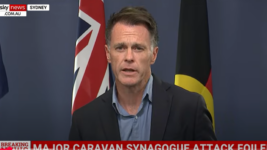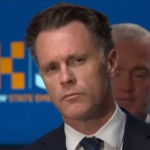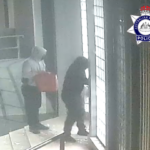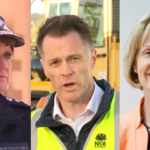Dural Caravan Antisemitism Inquiry: A Premier Class in Avoiding Parliamentary Scrutiny

The second day of hearings into the New South Wales parliamentary inquiry into the understanding that premier Chris Minns had in regard to the potential for a 19 January 2025 discovered caravan filled with explosives and a note listing Jewish owned properties as possible targets, might actually be a staged hoax, has resulted in what appears to be strategic government stonewalling.
Established on 19 March 2025, the Select Committee on the Relationship between the Dural Caravan Incident and Parliamentary Debates on Legislation inquiry is attempting to verify whether Minns, NSW police minister Yasmin Catley and attorney general Michael Daley were privy to the fact that the caravan was considered a potential setup prior to passing a package of rights-eroding laws.
Taking place on Thursday, 22 May 2025, the second day of hearings involved public service officials, following a 7 April 2025 hearing involving law enforcement officers. And the three senior public servants, who work in close proximity to the premier, appeared to be well versed in providing such vague and ill-informed answers that nothing of much interest would be divulged to committee members.
Take NSW Premier’s Department secretary Simon Draper as an example. The inquiry covers the period from 19 January to 20 February, with a key incident being a 29 January press conference involving Minns and NSW deputy police commissioner Dave Hudson.
Yet, on being questioned about his knowledge around any pre-press conference briefing, Draper informed the committee members that he’d only just returned to work that same day, after having been on leave.
Indeed, the government employees testifying on Thursday were well primed in how to avoid directly answering questions that might provide clarity on whether the premier passed new criminal offences regardless of being aware that senior NSW police officers held serious doubts about the legitimacy of the caravan scenario, whereas the senior cops that testified in April had been much more compliant.
A lack of documented evidence
The controversy surrounding the 29 January presser that saw Minns and Hudson reveal that a caravan filled with explosives had been located on a property on Dharug land in Dural ten days prior, is that the testimony of the deputy police commissioner on the first day of inquiry, suggests that he’d already told the premier he seriously considered the crime to be an elaborate setup.
Yet, when the pair were forced to face the cameras due to the explosive-laden caravan’s discovery having been leaked to the press, the NSW Labor leader appeared to amplify the idea that the discovery was potentially “a mass casualty event”, and during another presser on the following day, he further insisted that “there was only one way of calling it out and that is terrorism”.
But even though it was his first day back on the job, Draper told the inquiry, “with a high degree of confidence”, that the NSW premier had not engaged in any pre-press conference briefing, as he’d seen Minns right before it took place. And when asked about who takes the minutes during briefings about such incidents, Draper explained that briefings do not involve any record taking.
When further asked to elaborate on this scenario, Draper said that the premier would have decided to make the statements that he did make of his own volition and “relied on information that he’d been provided prior to that date”, and he underscored that there would be no documented evidence to support these claims as the Premier’s Department doesn’t take minutes during briefings.
Hudson told the inquiry in April, however, that he was suspicious that the caravan containing explosives might have been an attempted “manipulation of the justice system” from “quite early on”, and he added that during his “briefings, which were limited, with the premier,” he’d expressed his “suspicion over the motivation behind it from very early on”.
The deputy commissioner had actually first publicly flagged that he considered the caravan filled with explosives could be a hoax on 30 January during an interview with the ABC.
So, while the premier was insisting there was no other way to look at the incident than as terrorism, Hudson was attempting to allay the mounting fears amongst the Jewish community that the threat was real.
“Rammed through two days later”
On 10 March, the AFP, which had been investigating the Dural caravan incident, publicly announced that it had been staged to convey a potential antisemitic attack, and further, it confirmed that the 13 other major so-called “antisemitic” graffiti and arson crimes that took place in Greater Sydney from October 2024 through to February were all a “criminal con job”.
According to Draper, despite his having attended a number of briefings following his return to work regarding the caravan incident that would have involved discussions of the serious doubts NSW police had about it being a genuine threat, he told the inquiry he failed to form any opinion one way or the other until the AFP revealed it to be a hoax to the nation on 10 March.
But Hudson revealed to the inquiry that the AFP had confirmed his suspicions that the caravan was the work of organised crime, seeking to provide a bargaining chip in terms of receiving lesser punishment in exchange for information provided, on 20 February, which was the same date that the majority of the package of hate crime and antiprotest laws were passed.
In terms of the bills that were passed as a package in response to “recent incidents of antisemitic behaviour”, Cabinet Office secretary Kate Boyd told the inquiry on Thursday that the first briefing on “that suite of legislation” occurred in December 2024. But she couldn’t explain why two of the bills had been tabled on 11 February, while a third unexpected bill suddenly appeared on 18 February.
NSW Libertarian MLC John Ruddick further quizzed Draper as to why, at a point in time that parliamentarians and the public alike were aware that the caravan might be a hoax, the government didn’t pause on passing the laws until there was more clarity around the incident. And when no valid answer was forthcoming, the politician provided it for them: “We just wanted these laws passed.”
An inquiry-blocker
Inquiry chair Independent MLC Rod Roberts, who instigated the investigation, raised the point at the top of proceedings that he and all other committee members were holding “serious and grave concerns about the attempts of some witnesses to avoid appearing before this committee”, as its work is being frustrated by individuals “declining to attend, using spurious and tenuous arguments”.
In a 15 May letter addressing the Speaker of the Legislative Assembly, Greg Piper MP, premier Minns expressed his concerns that the inquiry terms of reference could threaten the parliamentary privilege of the lower house and the principle of comity between the two houses of NSW parliament.
Therefore, the NSW premier informed Piper that he intends to raise a motion at the earliest opportunity that refers “the Select Committee’s terms of reference to the Standing Committee on Parliamentary Privilege and Ethics for inquiry”, in order to gauge whether the investigation can continue.
Piper replied to the premier on the following day, agreeing with his proposal and suggesting that in the meantime, the government should refrain from meeting any request from the inquiry.
After Piper’s reply to the NSW premier, his chief of staff James Cullen, the chief of staff belonging to the NSW attorney general, Phillip Kelly, and the police minister’s chief of staff, Ross Neilson, all wrote individually to Roberts informing him that they would not be attending the 22 May inquiry hearing.
Cabinet Office deputy secretary Mark Hare also wrote to Roberts on 20 May in response to a letter from the chair requesting that “staff of The Cabinet Office and the Premier’s Department, Ms Kate Boyd, Mr Simon Draper and Ms Kate Meagher” attend the 22 May inquiry hearing or otherwise the committee would seek to summons them, to which Hare confirmed they would be in attendance.
So, while the trio did attend the hearing to inform the inquiry that they don’t know much about anything and that there are no briefing notes to jog their memories, the premier is now gearing up to have another committee attempt to end the inquiry that’s currently scrutinising his dubious lawmaking actions in passing a series of laws based on a manufactured antisemitic scare campaign.







